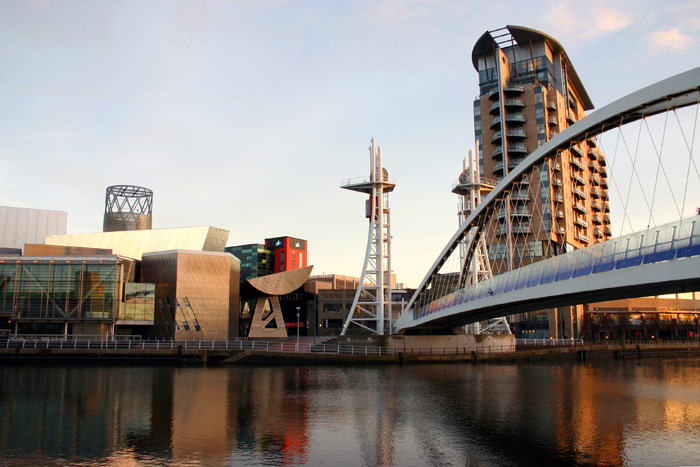
Relocate To Manchester
If ‘it’s grim up north’ nobody told Manchester. Although it faces challenges, it is still one of the most successful cities in the UK and shows no signs of flagging in the foreseeable future.
‘Greater’ Manchester, or the actual city district is the largest travel-to-work conurbation in the UK, outside of London. This is according to New Economy, an organisation that works on behalf of the Greater Manchester Combined Authority and the Greater Manchester Local Enterprise Partnership who suggest that seven million people live within an hour’s drive of the centre. Clearly any city with such immense pulling power must have its good points.
Here are some of the reasons why Manchester might be added to your ‘Possible relocation’ list:
- Manchester is regarded by many as the UK’s second city and with such a robust economic performance it’s easy to see why. The Greater Manchester economy generates £56 billion of gross value added (GVA) on an annual basis (e.g. £56 billion of real value produced in the economy, like national GDP). This is higher than results for the North East, West Yorkshire and Merseyside. Furthermore, GVA is predicted by the Greater Manchester Forecasting Model (GMFM) to rise by 2.8% per year until 2024 from where it was in 2014 – in line with the UK figure and above the North West annual rise of 2.6% – increasing to more than £72 billion by the end of this period.
- Outside of London, Greater Manchester is the UK’s main centre for the business, financial and professional sector, employing 324,000 people and generating £16.2 billion of GVA annually. Key companies include Co-op Banking Group, RBS and BNY Mellon.
- The health and social care sector employs 177,000 people. Assets include the UK Biobank.
- Manchester has traditionally been known as a (modern) cultural hub so it isn’t surprising that Greater Manchester has one of the largest creative and digital clusters in the UK, employing 63,500 people with big players such as ITV and BBC as well as the MediaCityUK site providing kudos and prestige to the area.
- On the more traditional side, manufacturing is still an important factor in Manchester’s economic success, employing nearly 10% of residents in Greater Manchester (123,000) with 54,000 people working in advanced manufacturing, for companies including NXP, Siemens and Holroyd.
- Unusually, sport is also a major part of the city’s economy. Although the sector only employs 18,100 people it punches above its weight, generating annual GVA of £0.33 billion. As well as football clubs like Manchester United and Manchester City, the area is home to major sporting companies such as Adidas and Umbro and national organisations such as British Cycling.
- Greater Manchester continues to attract inward investment. Again according to the New Economy, 400 such inward investment projects in the period from 2010 to 2015 created and safeguarded over 22,500 jobs.
- Manchester also seems to be an environment where entrepreneurialism thrives with 14,225 new businesses created in Greater Manchester during 2014 (contrasting with 3,620 business failures).
- The gross median annual wage for full time workers living in Greater Manchester is £25,500, compared to a UK figure of £27,600.
Reaching out
As well as inward investment helping to secure a bright future for Manchester, the city is reaching out and strengthening ties with India with the aim to achieve more bilateral trade, says a brief report on the website of Manchester inward investment agency, MIDAS.
An event, hosted by MIDAS and the High Commission of India, was supported by the Confederation of Indian Industry, UKTI and Deloitte. ‘Make in India, Innovate in Manchester’ enabled delegates to better understand the bilateral trade, export and R&D collaboration opportunities presented by Indian Prime Minister, Narendra Modi’s initiative and how the city region is strengthening ties with India.
Manchester’s top brands
Following the centre for brand analytics research, The Manchester Evening News brought together the opinions of marketing experts to name their top North West brands (in 2015). The list shows a diversity of brands spread across several sectors.
Kellogg’s
Established in the UK for over 90 years, Kellogg’s has been producing breakfast cereals in Manchester including Crunchy Nut, Rice Krispies and Cornflakes for decades.
BBC
The national broadcaster has a massive presence in Salford.
Manchester United FC
There’s no denying that football is big business.
Warburtons
Starting from a small family-owned shop in 1876 Warburtons is now the largest bread brand in the UK.
AO.com
The Bolton based company shows how success is possible if the tricky transition to online is managed properly.
Betfred
Another family business (started by brothers, Fred and Peter Done) is now one of the world’s largest bookmakers.
Boohoo
The online fashion retailer, based in the Northern Quarter, designs, sources, markets and sells own-brand clothing, shoes and accessories through its website to a core market of 16 to 24-year-olds.
Manchester City FC
In 2008, Abu Dhabi-based Abu Dhabi United Group Investment and Development Limited completed a takeover of City in a deal, worth a reported £200 million.
Co-op
Director of MediaCom, Julia Shepherd, said: “The largest consumer co-operative in the UK built from a foundation of sound ethics and fair trading which, in spite of recent troubles still holds consumer resonance 170 years later. There are some great lessons on brand building in there.”
Peel Holdings
A huge business which has been at the heart of several property development and regeneration projects in the North West, not least MediaCityUK, which is influential in bringing national and international business to Salford and Manchester.
Shop Direct
The catalogues and web-based business has a national distribution centre in Chadderton, Oldham, distribution centre in Little Hulton in Worsley and a dedicated financial services base in Bolton.
Missguided
This might be a brand to watch. It was identified in the Sunday Times Virgin Fast Track 100 league tables of 2014.
House prices by Rightmove
Terraced properties had an average sold price of £139,169 and semi-detached properties averaged at £185,341. Manchester, with an overall average price of £162,814 was more expensive than nearby Hulme (£128,184), but was cheaper than Castlefield (£179,953) and Manchester City Centre (£173,197).



